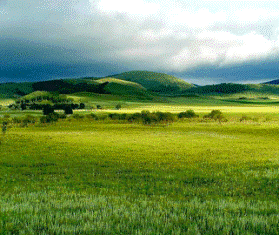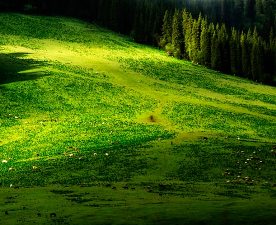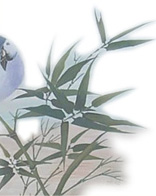|
 Listen to Shirley Singing the Poem in English & in Chinese Feb 18, 2012 Listen to Shirley Singing the Poem in English & in Chinese Feb 18, 2012
 Listen to Shirley Singing the Poem in Chinese & in English Feb 18, 2012 Listen to Shirley Singing the Poem in Chinese & in English Feb 18, 2012
  Listen to Shirley Explaining the Poem Listen to Shirley Explaining the Poem
  Follow Shirley to Read the Poem & Chinese Characters Follow Shirley to Read the Poem & Chinese Characters
 Learn the Meaning of the Poem Learn the Meaning of the Poem
 See Shirley Painted Picture for the Poem Feb 16, 2012 See Shirley Painted Picture for the Poem Feb 16, 2012
 Have you been to any ancient plain? Do you like the little grass on it? I do. Have you been to any ancient plain? Do you like the little grass on it? I do.
I really admire the vital force of the little grass. No matter how cold and how hard winter it has experienced, as soon as the spring breeze blows over, it will quickly grow up and dresses the land a beautiful green clothes...
In the thousands and thousands Chinese poems that sings the little grass, the most famous two lines are "Ye Huo Shao Bu Jin, Chun Feng Chui You Sheng -- The wildfire cannot burn the grass out, it re-grows in the spring breeze".from the poem Fu Do Guyuan Cao Songbie ? Sent Off on the Ancient Plain by Tang Dynasty(618-907) Poet Bai Jiuyi.
Chinese people use the lines in our daily language to compare to something beautiful and right cannot be pressured down forever, even though in the worst environment. As soon as the situation is getting better, it will re-grow at once. So, many art works -- movies, novels have chosen the lines or a part of the lines as their titles. And the first part of the poem includes the two lines has been chosen into the textbooks of the elementary schools and almost all of the Children's Poem Books. People usually chose the first 4 lines to recite.
This poem was written in 787. The two words "Fu de" in the title shows us it was an assignment of the examinations according to the rules of the national imperial examination in Tang Dynasty. There were some very strict rules on writing this kind of poems, therefore, there were not many good works, and however, this poem has been on everybody's lips for more than 1200 years.
Here is an interesting story about it:
When Bai Juyi was 16 years old, he went to the capital from his hometown. With his poems, he paid a formal visiting to the personage Gu Kuang.
At the first, Gu Kuang made a joke with the name of Bai Juyi (Ju Yi in Chinese means it is easy to live in somewhere) and said the price of the rice was expensive in Changan, it was not easy to live here at all. But when he read the words: Ye Huo Shao Bu Jin, Chunfeng Chui You Sheng, he could not helping greatly appreciated: Wow! Can wrote so wonderful poem, "Yu yi yi yi -- it will be easy to live" . And then, because Gu Kuang's good recommendation, quickly, Bai Juyi's reputation was greatly boosted. :-)
There are 8 lines in this poem. I would like to introduce the first four lines as most of people usually do.
The first line explains the essence of the title, writes something about the "ancient" , "plain" and the "grass" : What lush grass it is on the ancient plain! They are very common words, but, they have caught the characteristics of the grass -- very exuberant vitality.
Then in the second line, it writes the second characteristics of the grass -- each year it withers and flourishes. When I translated it, I thought for a long time and I asked myself whether I should translate it as “each year it flourishes and then withers” according to its usual growing regular? Finally, I decided to totally stick closely to the original. Because, it flourishes and than wither, this writes the grass in the autumn; it withers and flourishes, this writes the grass in the spring.
This line does not only write out of the regularity of the grass' growing, but also, it is the preparation for the next line.
The third and the fourth lines" Wildfire cannot burn it out, It re-grows in the spring breeze" are the famous lines through the ages, they are the development of the words "wither" and "flourishes" , continue to write the most important characters of the grass ? strong life power, meanwhile, “ paint out ”some two beautiful paintings.
It cannot be cut out totally, it cannot be uproot at all.
With the lines "wildfire cannot burn it out", create a more heroic artistic conception -- The wildfire is strong and terrible, it can destroy every thing and burn the grass in the twinkling of an eye. Anyway, no matter how the fire is strong, it cannot burn out of the roots of the grass, as soon as the spring breeze blows back the ancient plain, it will reawake and re-grow and recovers the ground quickly.
To emphasize the power of the wildfire is just for emphasizing the power of the re-growing of the grass in the spring.
The hot and red wildfire is strong, the soft and green grass is stronger, now, the fourth line has echoed the first line, it not only expresses the grass' character once more, but also, it expresses an idea of the poet -- the beautiful thing usually re-grows from its destroy.
When I write here, I could not help thinking of the story Rise of the Phoenix. Both of them have the different approaches but equally satisfactory results. :-)
This poem uses a very simple language, but it is neat and orderly, every word expresses its meaning exact and meaningful, therefore, it has been liked by Chinese people and both of the third and fourth lines have become very famous since they were created.
I translated it into English and wrote a piece of music to match it first time in Jun, 2006, corrected them in 2007; then I created a painting to match it in them in Jan, 2010; now, in Feb, 2012, I re-wrote this music and re-translated the poem by the good help by Mr. Mike J from U.K., Mr. William G., Dr. Dennis H. from U.S.A., Pref. Meng Weiye and Mrs. Xiaogang Z. from China, and then I re-painted a new painting for the poem in my school at Chinese National Academy of Arts.
I really hope that our effort will be some of help with you to learn Chinese culture and language.
MAIN MEANING OF THE POEM
Lush grass grows on the ancient plain,
Each year wither and flourishes,
Wildfire cannot burn it out,
It re-grows in the spring breeze.
Chinese Characters and Pronunciations
You can clink any Chinese Character to open the New Character Board and to see its Chinese pinyin, meaning, pronunciation and follow me to read it, also, you can hit the links over to enter the Painting Column,or you can directly enter the art notes on the painting that I created for this poem to see my painting and art notes for the poem
赋得古原草送别 ( 第一部分 -- The first part of the peom)
白居易 ( 唐 )
离离原上草,
一岁一枯荣。
野火烧不尽,
春风吹又生。
 If you have any questions, comments and suggestions, please write to shirley@ebridge.cn , or shirleyz004@yahoo.com, You are welcome. If you have any questions, comments and suggestions, please write to shirley@ebridge.cn , or shirleyz004@yahoo.com, You are welcome.
Shirley Zhang
Feb 20, 2012 /Jan 31, 2010/ Oct 7, 2007/ Jun 10, 2006
|

